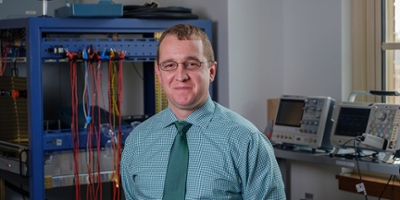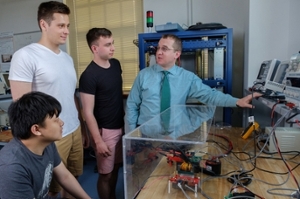ASG Outstanding Professor promotes power electronics with practical passion


Mark Scott reviews a project with graduate students
Yan Liu and Egor Iuravin and senior Nick Wolford.
By Carole Johnson, university news and communications
For electrical engineer Mark Scott, the pathway to teaching began with a feeling, nothing logical, but a strong passion for sharing the practical potential of power electronics.
This year’s Associated Student Government Outstanding Professor Award winner dabbled in amateur radio with his father as a child and teen. Together they experimented with electrical engineering by building measurement equipment and constructing antennas for their transceivers. Music was also a driving factor, and one of their first projects was building an AC/DC power supply and an audio amplifier.
Today, Scott, assistant professor of electrical and computer engineering, continues that sense of discovery with his students by creating learning experiences that teach the fundamentals of electrical engineering while building their résumés.
This semester, students in his power electronics course designed and produced their own power converter. In a typical class, students see only the power transistors, and they don’t develop an appreciation for the rest of the circuitry required to make the hardware work. For example, all of the extra components that are necessary to simply turn on a circuit.
Teaching philosophy pushes students to think NASA
Scott pushes his students to build and compare their work with others to understand the impact of their design choices. In this case, students learned the smaller the circuit board, the more economical it became when put into production. They also see how on a printed circuit board, the lengths of the traces matter in the design, as they can affect the performance. Miami University is the only school that Scott is aware of that teaches power electronics this way.
“By building it, they come to appreciate the nuances that you don’t learn by reading a textbook where everything is ideal. Once you leave college, nothing is ideal anymore,” he said.
In this class alone, students gained the skills that could land them internships at places like NASA, according to Scott. They use up-to-date industry-standard software, such as Code Composer Studio, and acquire the knowledge base required to do power electronics development in companies that do work in renewable energy, automotive and aerospace industries, among others.
Senior Nick Wolford said that building the circuit gave him that cherished practical experience of seeing the theories in practice. “I learned the most from him.”

K-12 students create working speakers to use with
smartphones and MP3 players in a Miami outreach
program. (Photo by Matt Boubin)
Forward thinking increases student excitement
As an applied researcher, Scott maintains constant contact with industry leaders. He’s a member of the Power Supply Manufacturers Association, a nonprofit organization of professionals from around the world that promote power conversion technology.
Scott is involved in developing roadmaps to document the direction the industry is taking with its technology. He is also actively involved in the Institute for Electrical and Electronic Engineers (IEEE) and the societies doing research in power electronics.
Scott is among a limited number of academics at Miami who is doing research in power engineering. His research includes:
- Applying silicon carbide and gallium nitride into motor drive systems for electrified vehicles and other renewable energy applications.
- Modeling and mitigation methods of electromagnetic interference in power electronics.
- Power electronics for medium-voltage, high-power applications.
- Studying the relationship among human behavior, power consumption and energy-related legislation.
It’s this forward thinking that excites his students, like Ben Shaffer, who nominated Scott. Each year, professors are nominated by graduating seniors for having a profound impact.
Shaffer, a graduating senior, credits his mentor for his pursuit of a doctoral degree. Shaffer will begin a program this fall at Ohio State University.
“Mark's teaching of microelectronics is potentially the turning point that led me to my current career. Mark teaches the very complex and confusing field of power electronics in a manner that is enjoyable.”
Scott takes this enthusiasm and also channels it to younger students. In 2016, he helped spearhead an outreach program with Talawanda High School. Students combine music and engineering by building their own speaker drivers.
Scott and Yamuna Rajasekhar, also an assistant professor of electrical and computer engineering, taught the first class. In addition, elementary students visit Miami each summer to build their own speakers.
“Once you present engineering concepts in terms that most people can understand, it becomes fun, exciting and empowering to realize what you can do with electricity and circuits,” Scott said.

